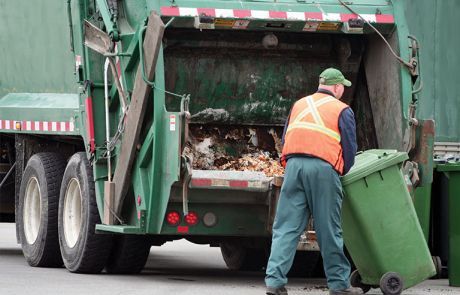Interviews
You are here
From the front lines - Niagara sanitation worker speaks out

April 14, 2020
Kyle Hoskin is a sanitation worker in the Niagara region, and activist with CUPE 1287. He spoke to Socialist Worker about how COVID-19 is impacting him and other frontline workers.
SW: How have you been navigating the COVID-19 situation as a sanitation worker?
Kyle (KH): My workplace has implemented many changes during this crisis. We used to have a biometric style handscanner for punching in. As well we used to have a coffee maker in the yard, both have ceased use.
The employer implemented a plan to stage rolling out our crews in 15 minutes intervals to increase social distancing. As well they are supplying nitrile gloves and hand sanitizer. As well I’m working on getting masks to the staff.
The municipality has changed collection as well. Waste must be in bags even if it’s in a can. Tissues, toilet paper, and paper towel must be bagged and in the garbage. Normally this material is acceptable in the green bin, but no longer during this time. They have also cancelled large item collection for items like couches or dressers temporarily.
SW: Sanitation workers are on the frontlines having to go to work during this crisis, what is the mood amongst your co-workers?
KH: My workers are angry and upset. They are upset they have to be out working during this crisis and angry there isn’t more being done. Myself and a few others are proud to be out doing this job. It’s incredibly important we continue cleaning our streets for the well-being of our community.
SW: In several cities workers have done health and safety refusals or walk outs to protest a lack of equipment and safety measures. Have you and your co-workers had to push the employer to make the job safer? Allowing people to work slower to make sure your safe. Allowing for breaks to wash hands, etc....
KH: The employer locally was incredibly quick at implementing many of the measures other municipalities have had refusals over. I’m paying close attention to when work refusals, or issues are raised by other groups as they come up. The biggest issue that is currently still going on is the access to washrooms and places to wash our hands. As well we need to get masks, but LTC and hospital staff need them before us so I’m trying to source homemade ones.
SW: Across the country municipalities have been trying to contract out waste collection., Do you think that once this over they will try to use the drop in revenues from this crisis as an excuse to further cut service or flip contracts to even lower bidders?
KH: Privatization of the waste sector has done nothing but dramatically reduce the quality of service. The service isn’t cheaper when it’s privatized. It actually increases in costs. So I can easily see an increased push to privatize waste across the province. Coming from the private side, I promise you that every single party but the contractor losses.
Either you take the lowest bid and get the worst service, or you get quality service for a higher price than if it had been held publicly. The argument to privatize waste services has been destroyed in many well researched studies.
SW: What do you see as opportunities in this crisis to set the stage for resistance to the likely austerity coming down the pike?
KH: We have been given free transit, models for UBI, push for rent freezes, reduce interest rates, and much more. We need to organize right now. Not tomorrow, not next week, right now. We need to organize the working class around the issues that matter most to them. The working class are hurting and we need to organize them, to help them. We have the opportunity of a century to change the status quo. We can’t go back to capitalism as usual. It brought this on us, we can’t let it do this again.
SW: What steps do you think the left and working class organsiations and activists need to be doing to to cut against the looming drive to make us pay for this?
KH: We need to organize. 15 for fairness, Broadbent, the CLC/OFL, and a few other organizations are pushing and mobilizing for change. We need to get onto this drive and build it up.
I can’t emphasize enough, we have the opportunity of a century, 5 generations to create change in what was the status quo. We can create the world we’ve been fighting decades for if we mobilize and build a movement right now.
Section:









